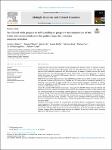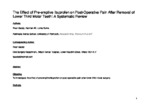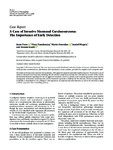Do clinical trials prepare to fail by failing to prepare? An examination of MS trials and recommendations for patient-reported outcome measure selection
Date
2023-08Author
Subject
Metadata
Show full item recordAbstract
BACKGROUND: Many clinical trials use patient-reported outcome (PRO) measures, which can influence treatment decision-making, drug approval and label claims. Given that many PRO measure options exist, and there are conceptual and contextual complexities with PRO measurement, we aimed to evaluate how and why specific PRO measures have been selected for pivotal multiple sclerosis (MS) clinical trials. Specifically, we aimed to identify the reasons documented for PRO measure selection in contemporary phase III MS disease-modifying treatment (DMT) clinical trials. METHODS: We searched for phase III clinical trials of MS DMTs published between 2015 and 2021 and evaluated trial protocols, or primary publications where available, for PRO measure selection information. Specifically, we examined study documents for their clarification of clinical concepts measured, definitions of concepts measured, explanations of which PRO measures were considered, why specific PRO measures were chosen, and trade-offs in PRO measure selection. RESULTS: We identified 1705 abstracts containing 61 unique phase III MS DMT clinical trials. We obtained and examined 27/61 trial protocols. Six protocols were excluded: four contained no mention of PRO measures and two contained redacted sections preventing adequate assessment, leaving 21 protocols for assessment. For the remaining 34 trials (61-27), we retrieved 31 primary publications; 15 primary publications mentioned the use of a PRO measure. None of the 36 clinical trials that mentioned the use of PRO measures (21 protocols and 15 primary publications) documented clear PRO or clinical outcome assessment (COA) measurement strategies, provided clear justifications for PRO selection, or reasons why specific PRO measures were selected when alternatives existed. CONCLUSION: PRO measure selection for clinical trials is not evidence-based or underpinned by structured systematic approaches. This represents a critical area for study design improvement as PRO measure results directly affect patient care, PRO measurement has conceptual and contextual complexities, and there is a wide range of options when selecting a PRO measure. We recommend trial designers use formal approaches for PRO measure selection to ensure PRO measurement-based decisions are optimised. We provide a simple, logical, five-stage approach for PRO measure selection in clinical trials.
Collections
Publisher
Place of Publication
Journal
Volume
Pagination
Number
Recommended, similar items
The following license files are associated with this item:
Related items
Showing items related by title, author, creator and subject.
-
The effect of pre-emptive Ibuprofen on post- operative pain after removal of lower third molar teeth: a systematic review
Gately, F; Ali, K; Burns, L (Springer Nature [academic journals on nature.com]England, 2022-03-04)Objective To investigate the effect of pre-emptive ibuprofen on post-operative pain after lower third molar surgery. Methods A search for randomised controlled trials was undertaken across the databases Medline, Embase, ... -
EXPLORING PRACTICE-BASED EDUCATION IN PODIATRY: AN ACTION RESEARCH PROJECT
Abey, Sally (Plymouth University, 2014)Background: Government policy has placed greater emphasis upon health professional students gaining practical experience in real-world environments. Given the fairly new inception of the role of clinical educator in ... -
A Case of Invasive Sinonasal Carcinosarcoma: The Importance of Early Detection
Yuen, J; Varadarajan, V; Stavrakas, M; Muquit, S; Khalil, Hisham (HindawiUnited States, 2018-04-22)<jats:p>Sinonasal carcinosarcomas represent rare neoplasms, with aggressive character and unfavourable prognosis. We present a case of extensive sinonasal carcinosarcoma extending into the anterior cranial fossa and into ...





